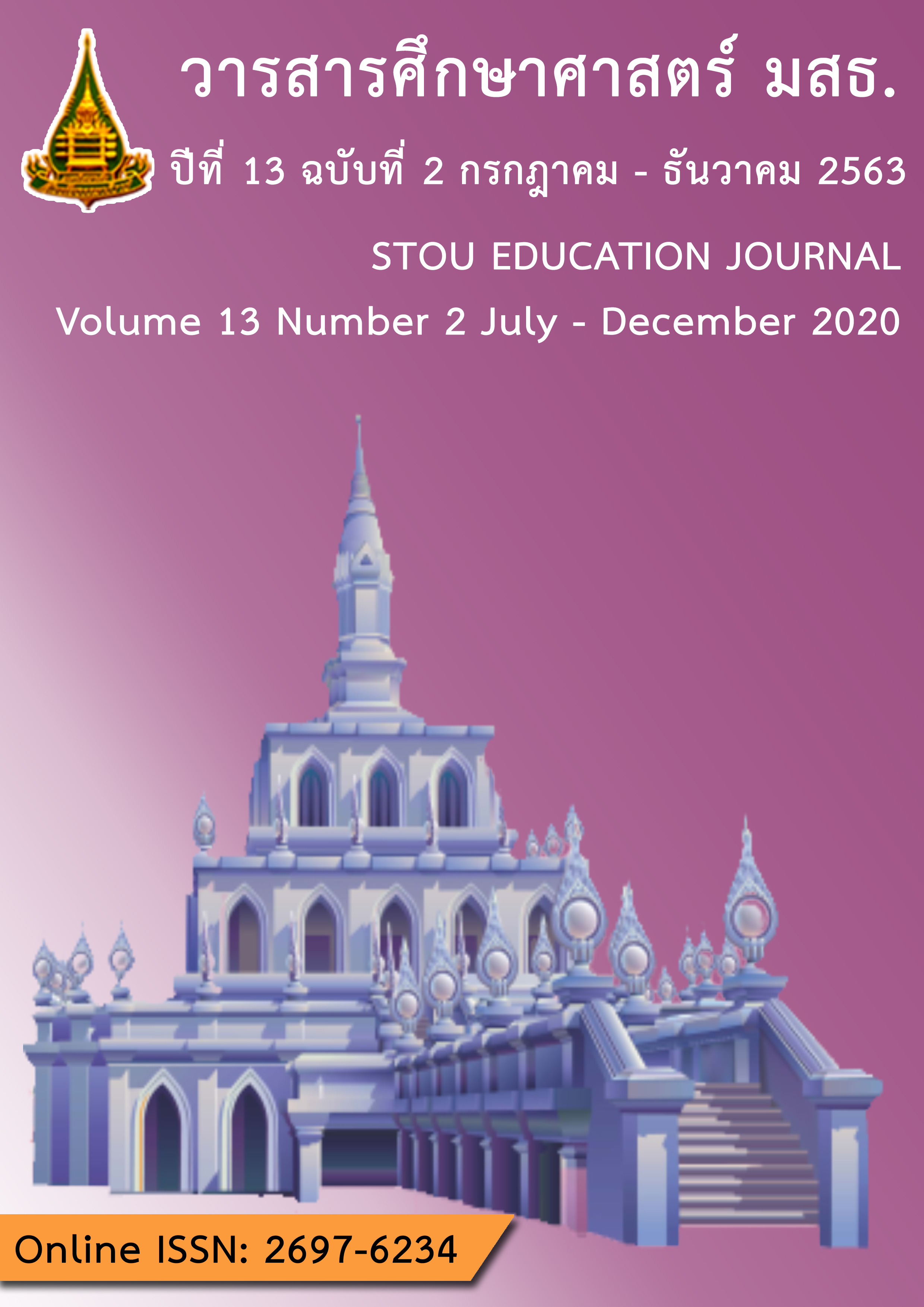การตรวจสอบวรรณกรรมอย่างเป็นระบบและการสังเคราะห์งานวิจัย เรื่อง การพัฒนาการให้เหตุผลเชิงจริยธรรมด้วยการสอนวิทยาศาสตร์ โดยใช้ประเด็นทางสังคมที่เกี่ยวเนื่องกับวิทยาศาสตร์
Main Article Content
บทคัดย่อ
บทความนี้เป็นการตรวจสอบวรรณกรรมอย่างเป็นระบบและการสังเคราะห์งานวิจัย เรื่อง การพัฒนาการให้เหตุผลเชิงจริยธรรมด้วยการสอนวิทยาศาสตร์โดยใช้ประเด็นทางสังคมที่เกี่ยวเนื่องกับวิทยาศาสตร์ นำเสนอความหมาย องค์ประกอบของการให้เหตุผลเชิงจริยธรรม ความหมาย ลักษณะสำคัญ รูปแบบหรือแนวการสอนที่ใช้ประเด็นทางสังคมที่เกี่ยวเนื่องกับวิทยาศาสตร์ ดำเนินการโดยคัดเลือกงานวิจัยที่เกี่ยวข้องจำนวน 12 ผลงาน ซึ่งใช้เกณฑ์คัดกรองคุณภาพ สังเคราะห์ผลงานวิจัยเชิงคุณภาพ ด้วยการอ่านงานอย่างใคร่ครวญ ตีความ หาคำสำคัญ หาแบบแผนของผลงานวิจัยเพื่อสร้างหัวข้อโดยใช้การเปรียบเทียบข้อมูล ผลการสังเคราะห์งานวิจัย พบว่า การพัฒนาการให้เหตุผลเชิงจริยธรรมด้วยการสอนวิทยาศาสตร์โดยใช้ประเด็นทางสังคมที่เกี่ยวเนื่องกับวิทยาศาสตร์ สามารถพัฒนาการให้เหตุผลเชิงจริยธรรมของผู้เรียนได้หลายด้าน ได้แก่ การใช้ภาษาแบบเป็นทางการ การคำนึงถึงผลกระทบในระยะยาว และการมีมุมมองความคิดที่หลากหลายมากขึ้น อีกทั้งยังสามารถทำให้นักเรียนก้าวข้ามการใช้อารมณ์และสัญชาตญาณในการให้เหตุผลได้ ประเด็นทางสังคมที่นำมาใช้ในการสอนเพื่อพัฒนาการให้เหตุผลเชิงจริยธรรมจะต้องน่าสนใจและเป็นที่ถกเถียงกัน ไม่สามารถหาข้อสรุปหรือคำตอบที่ตายตัวได้ และเป็นประเด็นที่มีอิทธิพลต่อความรู้สึกทางจิตใจ แบ่งเป็น 2 กลุ่ม ได้แก่ กลุ่มประเด็นทางพันธุวิศวกรรมและการแพทย์ และกลุ่มประเด็นทางสิ่งแวดล้อม ทั้งนี้การพัฒนาการให้เหตุผลเชิงจริยธรรมนั้นจะต้องคำนึงถึงปัจจัยที่เกี่ยวข้อง ได้แก่ บริบทของผู้เรียน เช่น สภาพสังคมและเศรษฐกิจ ค่านิยมทางศาสนาและความเชื่อทางวัฒนธรรม และบรรยากาศในห้องเรียน และความรู้ทางด้านวิทยาศาสตร์ของผู้เรียนแต่ละคน
Article Details
เอกสารอ้างอิง
สำนักงานคณะกรรมการการศึกษาขั้นพื้นฐาน กระทรวงศึกษาธิการ. (2560). มาตรฐานการเรียนรู้และตัวชี้วัด กลุ่มสาระการเรียนรู้คณิตศาสตร์ วิทยาศาสตร์ และสาระภูมิศาสตร์ ในกลุ่มสาระการเรียนรู้สังคมศึกษา ศาสนา และวัฒนธรรม (ฉบับปรับปรุง พ.ศ. 2560) ตามหลักสูตรแกนกลางการศึกษาขั้นพื้นฐาน พุทธศักราช 2551. กรุงเทพมหานคร: โรงพิมพ์ชุมนุมสหกรณ์การเกษตรแห่งประเทศไทย.
Berne, B. (2014). Progression in ethical reasoning when addressing socio-scientific issues in biotechnology. International Journal of Science Education, 36(17), 2958–2977.
Bucciarelli, M., Khemlani, S., & Johnson-Laird, P. N. (2008). The psychology of moral reasoning. Judgment and Decision Making, 3(2), 121-139.
Fowler, S. R., Zeidler, D. L., & Sadler, T. D. (2009). Moral sensitivity in the context of socioscientific issues in high school science students. International Journal of Science Education, 31(2), 279-296.
Greene, J. D., Morelli, S. A., Lowenberg, K., Nystrom, L. E., & Cohen, J. D. (2008). Cognitive load selectively interferes with utilitarian moral judgment. Cognition, 107(3), 1144-1154.
Gutierez, S. B. (2015). Integrating socio-scientific issues to enhance the bioethical decision-making skills of high school students. International Education Studies, 8(1), 142-151.
Haidt, J. (2001). The emotional dog and its rational tail: A social intuitionist approach to moral judgment. Psychological Review, 108(4), 814-834.
Jafari, M., & Meisert, A. (2019). Activating students’ argumentative resources on socioscientific issues by indirectly instructed reasoning and negotiation processes. Research in Science Education (Advance online publication). Retrieved from https://doi.org/10.1007/s11165-019-09869-x
Jones, A., McKim, A., Reiss, M., Ryan, B., Buntting, C., Sauders, K., . . . Conner, L. (2007). Research and development of classroom-based resources for bioethics education in New Zealand: Final report. New Zealand: University of Waikato.
Karahan, E., & Roehrig, G. (2017). Secondary school students’ understanding of science and their socioscientific reasoning. Research in Science Education, 47(1), 755-782.
Lee, H., Chang, H., Choi, K., Kim, S.-W., & Zeidler, D. L. (2012). Developing character and values for global citizens: Analysis of pre-service science teachers’ moral reasoning on socioscientific issues. International Journal of Science Education, 34(6), 925–953.
Lee, H., Yoo, J., Choi, K., Kim, S.-W., Krajcik, K., Herman, B. C., & Zeidler, D. L. (2013). Socioscientific issues as a vehicle for promoting character and values for global citizens. International Journal of Science Education, 35(12), 2079–2113.
Lee, Y. C., & Grace, M. (2012). Students’ reasoning and decision making about a socioscientific issue: A cross-context comparison. Science Education, 96(5), 787-807.
Lewis, S. E. (2003). Issue-based teaching in science education. Retrieved from http://www.actionbioscience.org/education/lewis.html?print
Marks, R., & Eilks, I. (2009). Promoting scientific literacy using a socio-critical and problem-oriented approach to chemistry teaching: concept, examples, experiences. International Journal of Science and Environmental Education, 4(2), 131-145.
Rest, J., Bebeau, M., & Volker, J. (1986). An overview of the psychology of morality. New York: Praeger.
Sadler, T. D. (2004). Informal reasoning regarding socioscientific issues: A critical review of research. Journal of Research in Science Teaching, 41, 513-536.
Sadler, T. D., & Fowler, S. R. (2006). A threshold model of content knowledge transfer for socioscientific argumentation. Science Education, 90, 986-1004.
Sadler, T. D., & Zeidler, D. L. (2004). The morality of socioscientific issues: Construal and resolution of genetic engineering dilemmas. Science Education, 88, 4-27.
Sadler, T. D., Amirshokoohi, A., Kazempour, M., & Allspaw, K. M. (2006). Socioscience and ethics in science classrooms: Teacher perspectives and strategies. Journal of Research in Science Teaching, 43, 353-376.
Sadler, T. D., Romine, W. L., & Topçu, M. S. (2016). Learning science content through socio-scientific issues-based instruction: a multi-level assessment study. International Journal of Science Education, 38(10), 1622-1635.
Saunders, K. J., & Rennie, L. J. (2013). A pedagogical model for ethical inquiry into socioscientific issues in science. Research in Science Education, 43(1), 253-274.
Simonneaux, L. (2001). Role-play or debate to promote students' argumentation and argumentation and animal transgenesis. International Journal of Science Education, 23(9), 903-927.
Stern, P. C., Dietz, T., & Black, J. S. (1985). Support for environmental protection: The role of moral norms. Population and Environment, 8, 204-222.
Yap, S. F. (2014). Beliefs, values, ethics and moral reasoning in socio-scientific education. Issues in Educational Research, 24(3), 299-319.
Zeidler, D. L., Sadler, T. D., Applebaum, S., & Callahan, B. E. (2009). Advancing reflective judgment through socioscientific issues. Journal of Research in Science Teaching, 46(1), 74-101.


